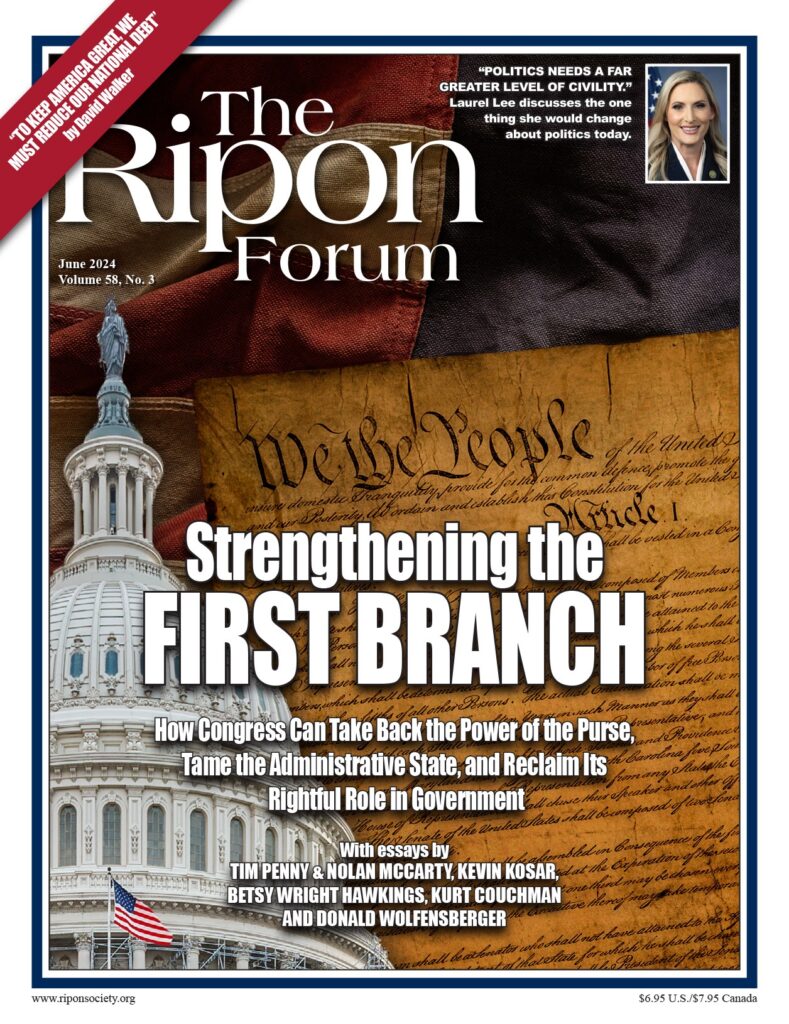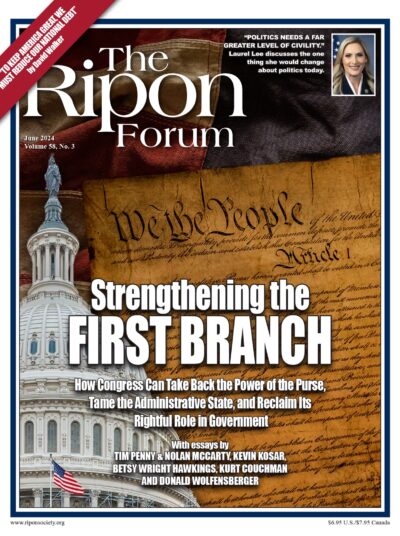
At a time when nearly three-quarters of the American people are expressing concern about presidents gaining more political power, the latest edition of The Ripon Forum examines how Congress can address these concerns and reclaim its rightful role as the First Branch of government.
Leading the Forum’s coverage are Tim Penny and Nolan McCarty. Penny is a former six-term Democratic Congressman from Minnesota; McCarty is a professor of politics and public affairs at Princeton. Together, they serve as Co-Chairs of the Task Force on the Power of the Purse, part of the Princeton Initiative on Restoring the Constitutional Powers of Congress. They write about this issue and their effort in the lead essay for this latest edition.
“Beginning in the 1990s,” the pair write, “the House and then the Senate became increasingly tribal with partisan majorities abandoning any pretense of trying to find common ground. In this more partisan environment, members of Congress who belonged to the same partisan team as the President saw it as their role to be adjuncts to the Executive Branch, allowing many of the previous excesses of presidential overreach to return. President Trump’s reprogramming to fund the border wall and President Biden’s attempts to forgive student loans are just two of the more egregious examples. By giving in to Presidential prerogatives, Congress is abdicating its constitutional power over the purse.”
To reverse this trend, Penny and McCarty, and the task force they lead at Princeton, are proposing a series of recommendations geared around improving transparency and accountability and expedited congressional review of executive spending. They outline these recommendations in their essay.
In another essay, Kevin Kosar of the American Enterprise Institute examines an area where executive overreach has grown exponentially in recent years — the administrative state. This is especially true, Kosar observes, when it comes to the current administration. “All told,” he writes, “Mr. Biden’s administration has issued nearly 250 significant rules since taking office in 2021, a pace that far exceeds any previous president … Regulations have the effect of law, and the Biden administration has used them to impose policies on major issues that are important to the Democratic party.”
To tackle this problem, Kosar is proposing something of a novel reform — namely, that a Congressional Regulation Office be established within the Legislative Branch to help the House and Senate counter the regulatory onslaught from future administrations. Kosar outlines this proposal in his essay, too.
According to veteran Hill aide Betsy Wright Hawkings, one of the reasons that presidents have been able to step in and grab more authority in recent years is because congressional dysfunction has resulted in a vacuum of power on Capitol Hill. “Increased competition for the House and Senate majorities … the nationalization of congressional elections with increased demand for partisan purity … reduced congressional resources. All have led to diminished congressional capability to solve problems,” Hawkings writes. She points to a number of reforms as ways Congress can fill this vacuum of power, and makes one other non-policy recommendation, as well — that member of Congress do more to build personal relationships with each other.
Longtime congressional observers Don Wolfensberger and Kurt Couchman have written a pair of essays focusing on the important role of committees on Capitol Hill, with Wolfensberger assessing the continued relevance of the House Rules Committee — where he once served as Chief of Staff — and Couchman taking a broader view explaining why committees should play a bigger role in lawmaking down the road.
In other pieces for the Forum, David Walker — who once served as U.S. Comptroller General and in recent years has become something of a Paul Revere when it comes to our national debt — examines why rising red ink is putting America’s future at risk; New York Congressman Mike Lawler discusses a bill he has authored to counter rising antisemitism on college campuses; and, hi-tech guru and entrepreneur Aron Solomon examines domestic data protection and whether Congress is taking the right approach.
Rachel Greszler of the Heritage Foundation and Kyle Ross of the Center for American Progress engage in a spirited debate about the future of Social Security and whether the minimum retirement age should be raised.
And in our latest Ripon Profile, Florida Congresswoman Laurel Lee explains why a return to civility is one of the top things she would like to see in American politics today.
As always, we hope you enjoy this latest edition of The Ripon Forum, and encourage you to contact us with any questions or comments you may have.
Lou Zickar
Editor of The Ripon Forum
louzickar@riponsociety.org




